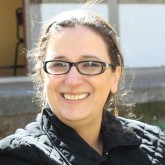 Fatima Zahra Tahiri is the Communications Officer for Creative’s Improving Training for Quality Advancement in National Education program in Morocco. In honor of International Women’s Day 2014, we asked for her thoughts on women in her country and her profession, and what inspires her.
Fatima Zahra Tahiri is the Communications Officer for Creative’s Improving Training for Quality Advancement in National Education program in Morocco. In honor of International Women’s Day 2014, we asked for her thoughts on women in her country and her profession, and what inspires her.
Question: Please explain in what ways your program involves women.
Answer: The ITQANE project focuses on improving the teacher training program in Morocco. It’s really about using the trainings as a way to improve the whole education system. The program involves many women – whether it be teacher trainers, teachers, school inspectors, community members, even young female students. They all benefit from this program and the improved educational opportunities its seen take shape.
I have worked in many of Creative’s education programs here in Morocco, and gender has always been considered a priority. For example, every time we organized a training, we would ask our partner to invite female participants. We would have these women participating, but they could not make decisions. This area was reserved to men. It was very frustrating. Thankfully, I’ve seen some changes recently, where women are given a voice by Government and private sector too.
Q: As a woman, what is it like to work on these issues?
A: This is my story…working in a country where men’s voice is premium is not easy at all. But, looking at the eyes of those little girls going every morning to the school to learn, thinking of them that they could be some day very important decision makers, that makes me work even harder. I am a mother, and I don’t want any of my girls to be sitting in her house waiting for her husband to bring her food or anything else…I want them to be independent and able to speak up for their rights with no fear.
In order to achieve this result, the shortest way would be through education. Teach the little boy how to respect those around him, including women. If we start this in preschool and we go on, once at 18, the boy will have no problem working with his peers, regardless of gender. This change of culture and behavior could affect the labor market as well. Men and women will benefit from the same chances and opportunities to get a job and there will be no jobs reserved for MEN and others for WOMEN.
Q: What is it like to be a woman in the country you work in?
A: It is the most difficult thing to be a woman in Morocco. All the time, you are fighting in a man’s world. You have to be very patient, they want to put you in the back seat. They underestimate you.
I will say it’s becoming easier to be a working, professional woman. But if you want to be high up in a company, you will be fought. You will be surrounded by men who don’t think you deserve that role. But it’s getting better. I’ve seen changes even in my lifetime. Now we can say people are getting used to it, they can accept women, and women in the professional world, easier.
Q: The theme of this year’s International Women’s Day is “Inspiring Change.” What changes have you helped make possible that you are proud of?
A: When I was working for Creative’s The Morocco Education for Girls project of which I was so proud, we worked closely with women; we saw women becoming active in the school life and chairing school committees. That was a BIG deal – having a woman sitting next to a man, discussing one of the school decisions and arguing about one or another activity was considered revolutionary. It was amazing to see, and to watch, as women really took a stand in representing their children and their community.
Q: Who or what inspires you to keep pushing for positive change?
A: I do this for my daughters. I have four daughters, and I don’t want to them to be dependent on anyone, so I’m trying to lead by example.